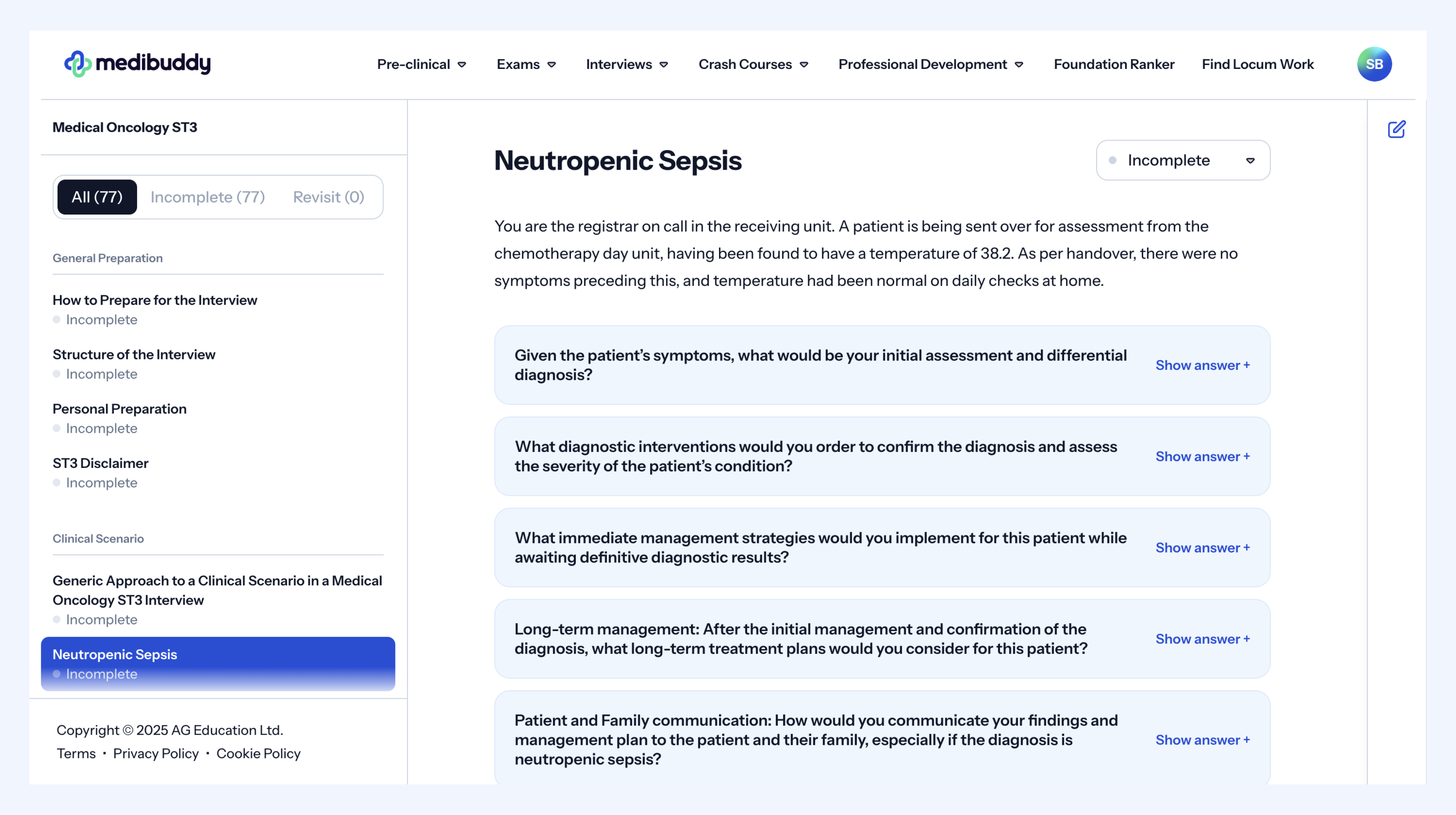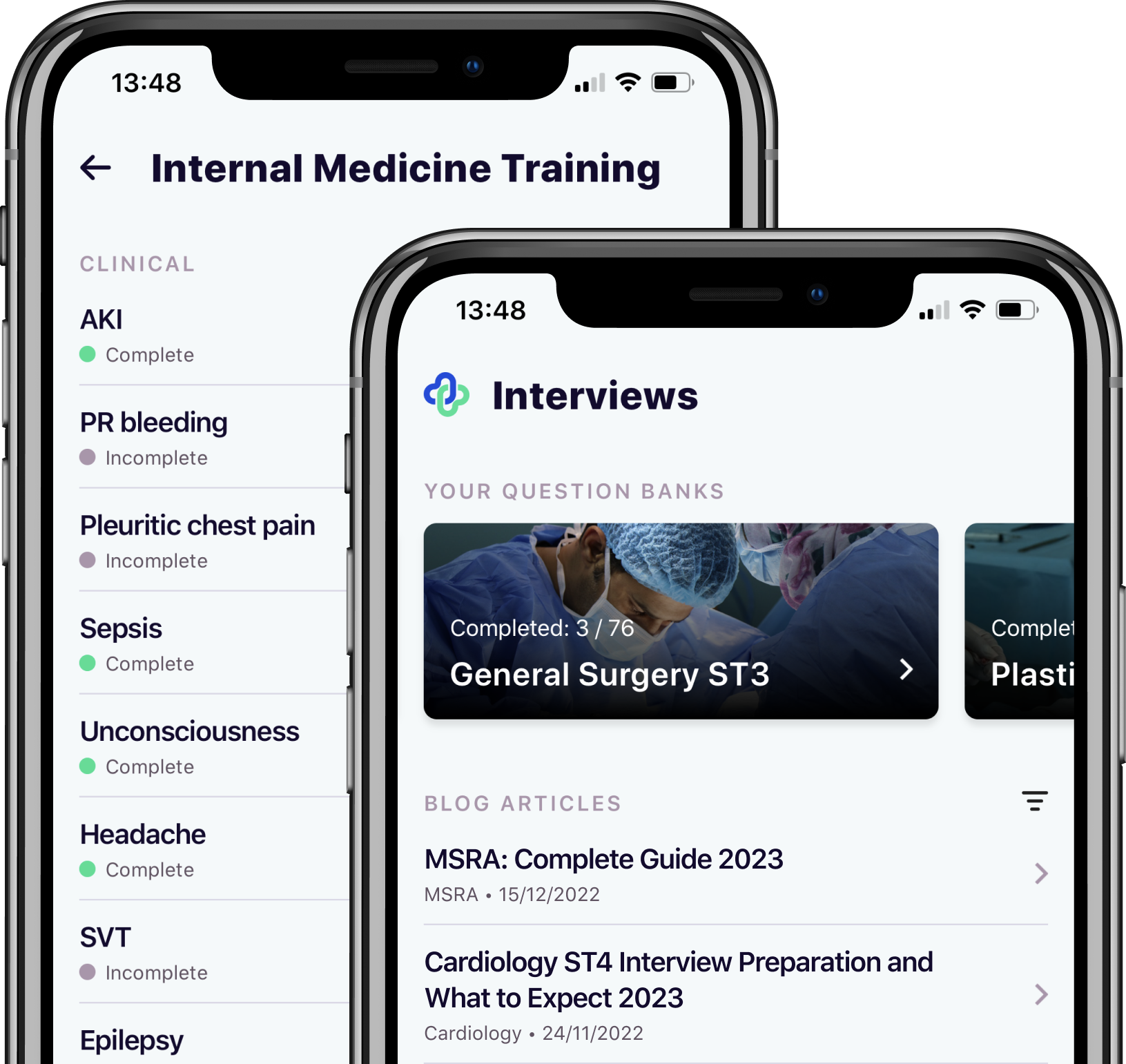
Medical Oncology ST3: Interview Guide 2026
Are you looking for a 2026 Medical Oncology ST3 interview guide to help you with your application? Our guide covers everything relating to the application process, including the recruitment timeline, the interview format and how it’s scored.
Last year’s competition ratio will give you an idea of what you’ll be up against in the upcoming recruitment round. In 2025, there were 319 applications for 101 posts. This resulted in a competition ratio of 3.16, meaning over three people applied for each post. We created this Medical Oncology ST3 interview guide to help you beat the competition.
Maximise your performance at the Medical Oncology ST3 interview by preparing effectively and efficiently with our Interview Question Bank.
Medical Oncology ST3 Application
The Medical Oncology ST3 recruitment process occurs twice a year. For August 2026 start dates, the application window opens on 20 November 2025 and runs until 11 December 2025.
The Medical Oncology ST3 eligibility criteria varies depending on your training background. For example, if you have a medical background, you must have completed the internal medicine training (IMT) stage 1 programme or equivalent and MRCP(UK) to be eligible. This includes finishing MRCP Part 1 by the time of application and MRCP Part 2 by the offer day.
More information on the eligibility criteria can be found in the 2026 Medical Oncology ST3 person specification.
Medical Oncology ST3 Application Scoring
Part of the Medical Oncology ST3 application form requires you to answer self-assessment questions. A total of 38 points are available across the following domains:
| Assessment area | Maximum score available |
|---|---|
| Postgraduate degrees and qualifications | 4 |
| MRCP(UK) | 8 |
| Presentations / posters | 6 |
| Publications | 8 |
| Teaching experience | 5 |
| Training in teaching | 3 |
| Quality improvement | 4 |
You’ll also be assessed on your commitment to specialty as part of the shortlisting process. The Physician Higher Specialty Training Recruitment website provides further information on how your commitment to specialty will be scored.
Later in the process, you’ll have to provide evidence to support your claims in the self-assessment section. The assessors will then use these documents to verify your self-assessment scores. How well your documents are organised will also be assessed, with a further 2 marks available for well-organised evidence. However, if the presentation of your documents isn’t clear, your application might not be shortlisted.
You can find more information about the Medical Oncology ST3 application scoring and evidence verification on the Physician Higher Specialty Training Recruitment website.
Boost your Medical Oncology ST3 application score by Training in Teaching
Completing a higher teaching qualification, such as a PG Cert or PG Diploma, can add up to 3 points to your Medical Oncology ST3 application. However, these courses can be lengthy and often difficult to complete before the interview stage.
An easier way to gain teaching points is by attending a Live Teach the Teacher Course with at least six hours of interactive, real-time teaching. This will give you 1 point towards your Medical Oncology ST3 score. Our 1-day and 2-day course options make it easy to fit into your schedule, whether you prefer an intensive or more in-depth experience.
Medical Oncology ST3 Recruitment Timeline
The 2026 recruitment dates for round 1 of Medical Oncology ST3 are as follows:
| Stage | Date |
|---|---|
| Application window | 20 November 2025 (10am) – 11 December 2025 (4pm) |
| Evidence upload date | TBC |
| Interviews | 19 – 20 March 2026 |
| First offers deadline | By 5pm 14 April 2026 |
| Offer holding deadline | At 1pm on 22 April 2026 |
| Offer upgrade deadline | At 4pm on 23 April 2026 |
| Interview Feedback release date | By 5pm on 24 April 2026 |
| Posts commencing from date | 5 August 2026 |
Medical Oncology ST3 Interview Format
The Medical Oncology ST3 interview is split across two stations. Each station consists of two questions, which take 5-6 minutes to complete. With each station taking 11 minutes, when you include the time between the stations, you can expect the interview to take around 30 minutes.
You can find more information on the interview stations below, allowing you to see what each question entails:
Station 1 Question 1 – Clinical Scenario
You’ll receive a clinical scenario at the start of the interview, which will only be a few sentences long. You’ll have a short time to review the scenario before facing approximately 6 minutes of interview questions.
The clinical scenario will describe a hypothetical situation in which you’ve become involved. To prepare for the discussion, you should think about the following points:
- Your next steps
- The potential treatments
- How you would communicate with other people involved in the scenario
- Any further information you would collect
- Any other factors you consider to be significant based on your experience
You can see an example below of a clinical scenario taken from our Medical Oncology ST3 Interview Question Bank.

Station 1 Question 2 – Ethical, Professionalism and Governance
This part of the interview assesses your understanding of ethical, professionalism and governance issues in a specific situation and will last approximately 5 minutes. Unlike the previous part of the interview, you won’t receive a brief before the question, but rather verbally, once you’ve finished the clinical scenario. The assessment will be underpinned by the principles of the GMC’s Good Medical Practice, so it’s recommended that you refresh your knowledge of this.
Station 2 Question 1 – Suitability and commitment
The part of the interview focuses on your suitability and commitment to Medical Oncology ST3 training. This question will last approximately 6 minutes and is an opportunity to build on the information you provided in the application form.
Station 2 Question 2 – Academic/research
Station 2 ends with a general discussion about research and academic medicine. You don’t receive any specific information in advance for this question. But, it’s worth getting to grips with how medical research takes place, so you have an idea of the costs, challenges and benefits of conducting research. You can also look into areas of research that interest you. This question will last approximately 5 minutes.
Medical Oncology ST3 Interview Scoring
Two separate assessors will score each question in your Medical Oncology ST3 interview. The scoring framework used to determine the scores you’ll be awarded is in the table below:
| Mark | Rating | Assessment |
|---|---|---|
| 1 | Poor | Not appointable |
| 2 | Area for concern | Performed below the expected level – the ability to progress depends on performance in other areas |
| 3 | Satisfactory | Performed at the expected level – the candidate is suitable for the next level of specialty training |
| 4 | Good | Performed above the expected level – the candidate is suitable for the next level of specialty training |
| 5 | Excellent | High-performing candidate – the candidate is suitable for the next level of specialty training |
Once your performance has been assessed, you’ll receive a raw interview score (RIS). This figure is the total of all eight of your interview scores. With the interviewers marking each question between 1 and 5, your RIS can range from 8 to 40.
Before you can be considered an appointable candidate and progress to the next stage, you must meet the following criteria:
- None of your eight interview scores can be 1/5
- No more than two of your scores can be 2/5
- Your RIS must be 24 or higher
If you meet the above criteria, your application will be deemed appointable, and you will progress to be considered for post offers. For the purpose of post offering, your raw interview scores and application score will have a weighting applied, before being combined to give your total score, which will be used to rank you. Posts are then offered in rank order.
You can find more information about the Medical Oncology ST3 interview scoring for 2026 on the Physician Higher Specialty Training Recruitment website.
Good luck!

Take your subscriptions with you
Our mobile app allows you to access your interview and exam question banks wherever you are.




